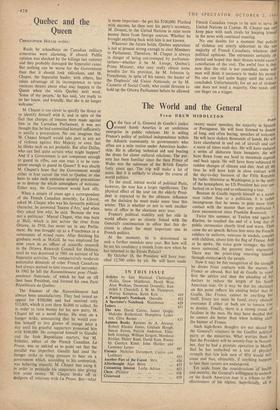Quebec and the Queen
CHRISTOPHER HOLLIS writes: Raids by schoolboys on Canadian military armouries were alarming, if absurd. Public opinion was shocked by the killings last summer and they probably damaged the Separatist cause. But nothing can be worse for the Government than that it should look ridiculous, and M. Chaput, the Separatist leader, with others, has taken advantage of its incompetence to utter ominous threats about what may happen to the Queen when she visits Quebec next week. 'Some of my people,' he has said, 'are ready to let her know, and brutally, that she is no longer welcome.'
M. Chaput is too clever to specify the threat or to identify himself with it, and in spite of the tact that charges of treason were made against him in the Canadian Parliament, it was not thought that he had committed himself sufficiently to justify a prosecution. No one imagines that M. Chaput himself would take part in any act of violence against Her Majesty or even that he thinks such an act probable. But after Dallas, who can feel quite certain what might happen? And if a Government is not competent enough to guard its rifles, can one trust it to be com- petent enough to guard its Queen? It was clearly M. Chaput's hope that the Government would either in fear cancel the visit to Quebec or else have to take such extensive security precautions as to destroy the whole atmosphere of welcome. Either way, the Government would look silly.
When a couple of years ago a correspondent of the French Canadian monthly, La Liberte, asked M. Chaput who was his favourite political character, he answered `Jeanne d'Arc,' and when they asked him why, he said, 'Because she was not a politician.' Marcel Chaput, who was born at Hull, which is just across the river from Ottawa, in 1918, has never sat in any Parlia- ment. He was brought up as a Frenchman in a community of mixed races. After finishing his graduate work at McGill, he was employed for nine years as an officer of scientific research in the Ottawa Research Council for Defence, until he was dismissed in 1961 on account of his Separatist activities. The comparatively moderate nationalist demands of other French Canadians had always seemed to him treason and surrender. In 1962 he left the Rassemblement pour Find& pendence Nationale, of which he.' had up till then been President, and formed his own Parti Republicain du Quebec.
The finances of the Rassemblement had always been unsatisfactory. They had issued an appeal for $100,000 and had received only $12,000, which it cost them $6,000 to collect. So in order to raise money for his new party, M. Chaput hit on a novel device. He went on a hunger strike, announcing that he would con- fine himself to two glasses of orange juice a day until his grateful supporters presented him with $100,000. He compared himself to Gandhi and the Irish Republican martyrs, but M. Pelletier, editor of the French Canadian La Presse, was so unkind as to point out that the parallel was imperfect. Gandhi had used the hunger strike to bring pressure to bear on a government which, according to his contention, was behaving unjustly. M. Chaput was using it in order to persuade his supporters into giving him some money. M. Chaput broke off in dudgeon all relations with La Presse. But—what
is more important—he got his $100,000. Flushed with success, he then sent his party's secretary, M. Doucet, to the United Nations to raise more money there from foreign sources. Whether he brought anything back with him is not known.
Whatever the future holds, Quebec separatism is not at present strong enough to elect Members to Parliament. Therefore, M. Chaput is always in danger of being out-trumped by parliamen- tarians—whether it be M. Lesage, Quebec's Prime Minister, who may really obtain some benefits for his province, by M. Johnson (a Frenchman, in spite of his name), the leader of the Duplessis' old Union Nationale, or by M. Caouette of Social Credit, who could threaten to hold up the Ottawa Parliament before he allowed French Canadian troops to be sent to serve the United Nations in Cyprus. M. Chaput can only keep pace with such rivals by keeping himself in the news with continual stunting.
No one doubts for a moment that policies of violence are utterly abhorrent to the vast majority of French Canadians, whatever their political opinions. The extremists certainly ex' pected and hoped that their threats would cause a cancellation of the visit. 'the awful fear is that now that the visit is not cancelled, some wild man will think it necessary to make his protest. No one can feel quite happy until the visit Is concluded. Unfortunately, for an act of violence one does not need a majority. One needs onlY one finger on a trigger.














































 Previous page
Previous page